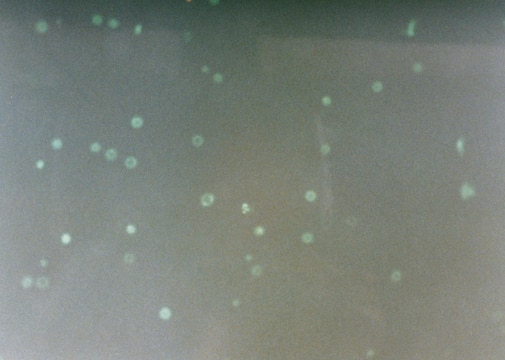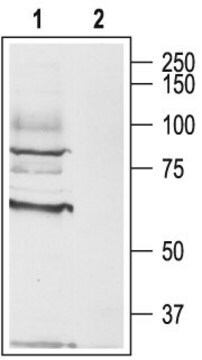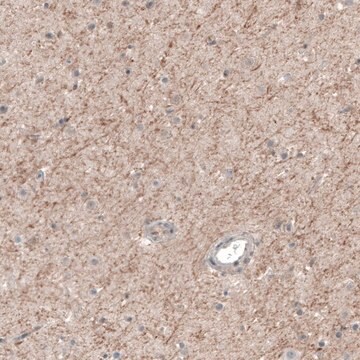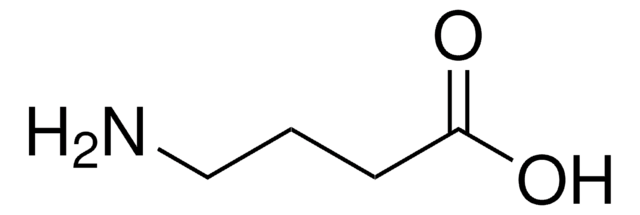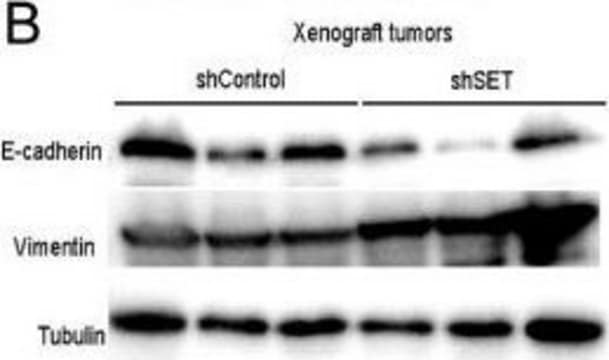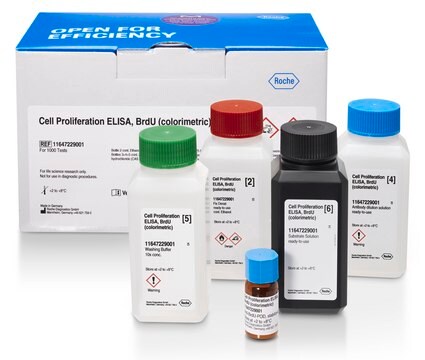M9808
Anti-Muscarinic Acetylcholine Receptor (M1) antibody produced in rabbit
affinity isolated antibody, lyophilized powder
Synonym(s):
Acetylcholine Receptor antibody
Sign Into View Organizational & Contract Pricing
All Photos(4)
About This Item
Recommended Products
biological source
rabbit
Quality Level
conjugate
unconjugated
antibody form
affinity isolated antibody
antibody product type
primary antibodies
clone
polyclonal
form
lyophilized powder
species reactivity
mouse, rat
technique(s)
immunoblotting: 1:200 using rat brain membranes
immunohistochemistry: suitable
UniProt accession no.
storage temp.
−20°C
target post-translational modification
unmodified
Gene Information
human ... CHRM1(1128)
rat ... Chrm1(25229)
General description
Muscarinic acetylcholine receptor 1 (M1) is a member of class A G protein-coupled receptors (GPCRs) family, which is encoded by the CHRM1 gene. Muscarinic receptors have seven transmembrane domains localized in the parasympathetic nerve sub-synaptic membrane. The CHRM1 gene is located on human chromosome location 11q12.3.
Muscarinic cholinergic receptor 1 (M1) is seen in the forebrain of rats.
Immunogen
GST fusion protein of a part of the i3 intracellular loop of human M1 muscarinic acetylcholine receptor (mAChR) corresponding to amino acid residues 227-353.1, 2
Application
Anti-Muscarinic acetylcholine receptor (M1) antibody produced in rabbit has been used in immunohistochemistry and Western blotting.
Applications in which this antibody has been used successfully, and the associated peer-reviewed papers, are given below.
Immunocytochemistry (1 paper)
Immunocytochemistry (1 paper)
Biochem/physiol Actions
Muscarinic acetylcholine receptor 1 (M1) regulates normal prostate growth and reduced-level glandular secretion. Muscarinic receptors play a major role in tumor progression. Muscarinic acetylcholine receptors (mAChRs) regulates adenylyl cyclase and potassium channel activities. It also stimulates various mitogen-activated protein kinases. M1 may be useful for the discovery of therapeutics for Alzheimer′s disease.
Studies have shown that activation of muscarinic cholinergic receptor 1 (M1) in rats leads to changes in the endotoxin tolerance in the liver.
Physical form
Lyophilized from a solution of phosphate-buffered saline, pH 7.4, containing 1% bovine serum albumin, and 0.05% sodium azide.
Disclaimer
Unless otherwise stated in our catalog or other company documentation accompanying the product(s), our products are intended for research use only and are not to be used for any other purpose, which includes but is not limited to, unauthorized commercial uses, in vitro diagnostic uses, ex vivo or in vivo therapeutic uses or any type of consumption or application to humans or animals.
Not finding the right product?
Try our Product Selector Tool.
Storage Class Code
11 - Combustible Solids
WGK
WGK 3
Flash Point(F)
Not applicable
Flash Point(C)
Not applicable
Choose from one of the most recent versions:
Already Own This Product?
Find documentation for the products that you have recently purchased in the Document Library.
Golnar Eftekhari et al.
European journal of pharmacology, 740, 436-441 (2014-07-11)
Endotoxin tolerance is a mechanism in which cells receiving low doses of endotoxin, enter a transient phase with less inflammatory response to the next endotoxin challenges. Central nervous system is known to modulate systemic inflammation through activation of the cholinergic
Anna Rebeka Oliveira Ferreira et al.
Frontiers in physiology, 13, 840179-840179 (2022-05-17)
Perturbations to nutrition during critical periods are associated with changes in embryonic, fetal or postnatal developmental patterns that may render the offspring more likely to develop cardiovascular disease in later life. The aim of this study was to evaluate whether
Jay F Muller et al.
The Journal of comparative neurology, 521(8), 1743-1759 (2013-04-06)
Muscarinic neurotransmission in the anterior basolateral amygdalar nucleus (BLa) mediated by the M1 receptor (M1R) is critical for memory consolidation. Although knowledge of the subcellular localization of M1R in the BLa would contribute to an understanding of cholinergic mechanisms involved
Sophie R Thomson et al.
Neuron, 95(3), 550-563 (2017-08-05)
Excessive mRNA translation downstream of group I metabotropic glutamate receptors (mGlu
xPharm: The Comprehensive Pharmacology Reference (2008)
Our team of scientists has experience in all areas of research including Life Science, Material Science, Chemical Synthesis, Chromatography, Analytical and many others.
Contact Technical Service